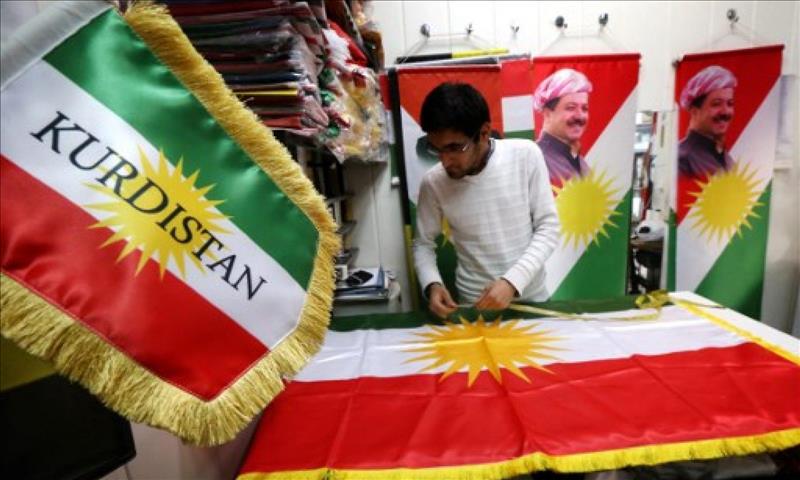
Kurdistan will be a success after independence from Iraq
The pro-independence feeling is getting stronger by each passing day in Kurdish areas of Iraq. In many cities the Kurdish flag flutters and the road signs and street and store names and the media are in Kurdish. It could take visitors to Erbil, the Kurdish Region's capital, several days to realize they are in Iraq.
By adopting the referendum method, the KRG will join many other states and political entities that have employed this procedure. Usually a declaration of independence needs to be preceded by a referendum. Without establishing the will of the people of Kurdistan on the issue, KRG leaders can hardly claim a popular mandate for such a move. Most recently independent states, such as South Sudan, held referendums first.But many Iraqi politicians and groups are declaring this referendum unconstitutional. As the experience in Yugoslavia showed, when ethnic or religious cleavages expand, the most effective path to peace may well be separation. And a Kurdish state has a real chance of thriving.
An independent Kurdistan could combine natural-resource wealth with a tradition of stable and pragmatic governance, thereby creating a sustainable democracy. This would amount to a win for pro-Western liberal forces in the Middle East.Let's have a look at the factors that can make independent Kurdistan a success story in the region.
Strong security apparatus. The Peshmerga is a very effective and well-trained military force that defends Kurdistan very well. When the Iraqi military melted away after putting up only minimal resistance to ISIS in 2014, it was the Peshmerga alone that stopped the expansion of the so-called Islamic State and even rolled it back. The Peshmerga has decades of experience warring against powerful opponents such as the very strong elite force of Saddam Hussein's Republican Guards. The Peshmerga is very capable of defending the sovereignty of an independent Kurdistan.Vibrant economy. The Kurdish Region now exports 600,000 barrels of oil per day, with up to a million per day on the horizon with existing and pending deals with large multinational oil companies. The KRG's budget deficit has thus shrunk by 99% 'from $4 billion in 2013 to just $63 million in 2016', Middle East analyst Zach D Huff in Forbes Middle East. Together with efforts to boost agriculture (Kurdistan is nearly self-sufficient for food now), manufacturing and the private sector in general, the future prospects of the region look better than those of many states.
Unity of political parties on independence. The region's leading parties such as the Kurdistan Democratic Party, the Patriotic Union of Kurdistan and the Gorran Movement support the independence of Kurdistan wholeheartedly. Gorran and the Komal Islamic Group support a referendum on independence but have some reservations about its timing and mechanism.Weak Baghdad. The Iraqi government in Baghdad will not be able to stop the Kurds, as its lacks the required military strength. The Iraqi army has deep structural problems such as large-scale desertions, widespread corruption and low morale. Baghdad can't afford to start a military campaign against the Kurds, and the chances of outside military intervention are slim as Syria is weak and Iran and Turkey are otherwise occupied on other fronts.
In the past, Kurds were considered a destabilizing element in the Middle East, but now the world has come to realize their important contribution to stabilizing the region and in fighting radical Islamists.The Kurds tried to make Iraq work after 2003 on the condition of federalism and a binational Iraq of equals with minority rights, but that hope has faded. Kurds are entitled to seek independence to enhance their secular and more progressive society as well as better relations with their neighbors.
Given how Kurds have been treated in the countries in which they live, it's no surprise that they have demanded the right to govern themselves and are willing to fight for that right. So it's high time that the international community caught up with Kurdish desires and helped Kurds build stable, democratic institutions, instead of taking the side of those who want to rule over the Kurds.The West should respect the yearning of disfranchised and oppressed peoples, beginning with the Kurds, for freedom, democracy, and competent governance, which remains vital for a durable Western imprint on the region's future. The time has come for the first redrawing of the Middle East map since the 1916 Sykes-Picot Agreement between Britain and France that sliced up Ottoman possessions into nation-states.
But it still has to be seen how Kurdistan chooses to separate from Iraq. Will the Kurds declare independence in one bold stroke, or do it through negotiations with the central government in Baghdad for amicable separation?It will be in the interests of both of them that separation happens though negotiations. In this scenario both can have key official linkages like a shared defense and foreign policies, and on hydrocarbon production, which benefits both.
The DailyBrief Must-reads from across Asia - directly to your inbox Asia Times is not responsible for the opinions, facts or any media content presented by contributors. In case of abuse, .
Legal Disclaimer:
MENAFN provides the
information “as is” without warranty of any kind. We do not accept
any responsibility or liability for the accuracy, content, images,
videos, licenses, completeness, legality, or reliability of the information
contained in this article. If you have any complaints or copyright
issues related to this article, kindly contact the provider above.


















Comments
No comment